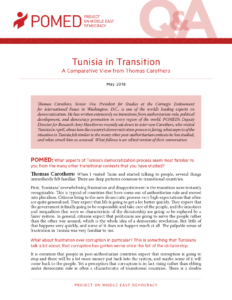Tunisians are aware of their country as the only one in the Arab world trying to make the Islamist–non-Islamist divide work in a genuinely democratic way, notes Thomas Carothers, Senior Vice President for Studies at the Carnegie Endowment for International Peace, where he directs the Democracy and Rule of Law Program. But Tunisia’s coalition government is fairly distinctive beyond the region, as well. Tunisia’s effort at political compromise and political balance has gone better than in many other countries, he tells the Project on Middle East Democracy, in a new POMED Expert Q&A, “Tunisia in Transition: A Comparative View.”
 Cautioning against any hint of democratic determinism, Carothers states that “rule number one if you are a comparativist studying transitions over time is not to make predictions. We just do not know what is going to happen. Tunisia’s future is up for grabs.” Read the Q&A here (PDF).
Cautioning against any hint of democratic determinism, Carothers states that “rule number one if you are a comparativist studying transitions over time is not to make predictions. We just do not know what is going to happen. Tunisia’s future is up for grabs.” Read the Q&A here (PDF).
Although Presidents George W. Bush and Barack Obama disagreed on how to promote democracy, they both thought spreading it was vital to America’s national security. But recent events in the Middle East suggest otherwise. Far from being the panacea that could save the volatile region from itself, democratization has bred unintended consequences that are tearing it apart, argues Yoav Fromer, who teaches at Tel Aviv University and Yeshiva University.
In Iran, Gaza, Turkey, Lebanon, Iraq and even Israel — the only functioning liberal democracy in the area — democracy may be the problem, not the solution. Instead of moderating extremism, the will of the majorities in these countries has been driving it, he writes for the Washington Post:
 Theorists and policymakers long thought that dictators like Hafez al-Assad in Syria or Saddam Hussein in Iraq were the cause of regional instability. But since the Arab Spring, there appears to be a growing gap between moderate, Western-oriented autocrats like [Egyptian president Abdel Fatah al-] Sissi, Jordan’s King Abdullah II and Saudi Crown Prince Mohammed bin Salman, and the majority of their citizenry that pulls in the opposite direction. Motivated by deeply rooted historical, economic, cultural and religious grievances, large majorities throughout the Middle East are hostile to the United States and Israel. Democracy and self-determination are, in most circumstances, salutary goals to be pursued and promoted. But in the Middle East right now, they are also catalysts for regional conflict.
Theorists and policymakers long thought that dictators like Hafez al-Assad in Syria or Saddam Hussein in Iraq were the cause of regional instability. But since the Arab Spring, there appears to be a growing gap between moderate, Western-oriented autocrats like [Egyptian president Abdel Fatah al-] Sissi, Jordan’s King Abdullah II and Saudi Crown Prince Mohammed bin Salman, and the majority of their citizenry that pulls in the opposite direction. Motivated by deeply rooted historical, economic, cultural and religious grievances, large majorities throughout the Middle East are hostile to the United States and Israel. Democracy and self-determination are, in most circumstances, salutary goals to be pursued and promoted. But in the Middle East right now, they are also catalysts for regional conflict.
“The particular form of government taking root in the Middle East — majoritarian rule without liberal institutions — has not made it any more safe or stable,” Fromer concludes.
Arab Center Washington DC (ACW) held a briefing on May 30, 2018 to discuss the recent elections held in Egypt, Iraq, Lebanon, and Tunisia, and the state of democracy in these countries as well as the Arab world. Speakers included: Rend Al-Rahim, President of the Iraq Foundation, Charles W. Dunne, Non-resident Fellow at ACW, Stephen McInerney, Executive Director of the Project on Middle East Democracy [a partner of the National Endowment for Democracy], and Paul Salem, Senior Vice President of the Middle East Institute. The discussion was moderated by Daniel Brumberg, Non-Resident Senior Fellow at ACW (see above).







